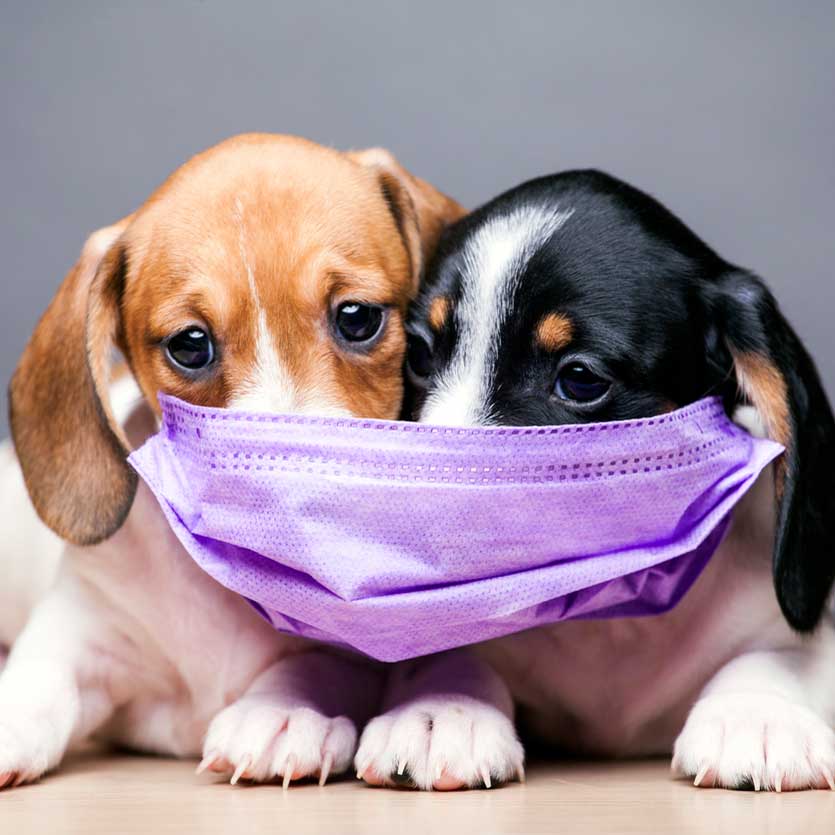COVID-19 has wreaked havoc worldwide since early 2020. This viral respiratory disease can cause people to experience issues from mild symptoms to severe illness. As you grapple with the concerns and inconveniences of the virus, you may also worry about your pet. COVID-19 is a concerning issue, but luckily pets are not typically significantly affected. So while you don’t need to outfit your dog or cat in a face covering, we have assembled some commonly asked questions and answers regarding COVID-19 and pets below to help you navigate these times with your furry friend.
Question: Can pets or other animals get COVID-19?
Answer: Yes. Pets and other animals can get COVID-19. Several animals have tested positive for the virus, including:
- Dogs — These cases are uncommon, but the disease is likely transmitted to dogs when their owners are infected. Most dogs who tested COVID-19-positive did not show any signs, although some cases did result in illness.
- Cats — Most cats who tested positive had known exposure to humans who had COVID-19. Some cats exhibited respiratory signs, and one cat also had vomiting and diarrhea.
- Tigers and lions — An outbreak at New York state’s Bronx Zoo resulted in four tigers and three lions having respiratory signs. Transmission likely occurred from an infected zookeeper.
- Minks — Many mink farms in Europe and the United States have been affected by COVID-19. The mink developed respiratory issues, and seem especially susceptible to the virus.
Q: Can I spread COVID-19 to my pet?
A: Yes. Most pets are infected after close contact with their owner or another person who has COVID-19. To protect your pet, follow these recommendations:
- Every eligible person in the household should get vaccinated.
- Do not allow your pet to contact anyone who has COVID-19.
- If you are sick, have another household member care for your pet. Avoid contacting your pet, including petting, sharing food, and sleeping in the same bed. If you must care for your pet while you have COVID-19, wear a mask, and wash your hands before and after contact.
- Do not allow your pet to contact unvaccinated people, if possible.
Q: Can I catch COVID-19 from my pet?
A: The risk of pets spreading COVID-19 to people is low, and no evidence has been found that the virus can be spread to people from a pet’s skin, fur, or hair. Do not put a mask on your pet, because masks could be harmful. Also, do not wipe or bathe your pet using chemical disinfectants, alcohol, hydrogen peroxide, or hand sanitizer.
Q: What signs do pets affected by COVID-19 exhibit?
A: Many pets do not show signs, but if present, signs include fever, cough, difficulty breathing, lethargy, sneezing, nasal discharge, eye discharge, vomiting, and diarrhea.
Q: What should I do if I think my pet has COVID-19?
A: COVID-19-infected pets who have shown signs have had only mild issues, and they fully recovered—so don’t panic. If you know your pet has been exposed to COVID-19, and they become ill, contact your veterinarian to determine the next steps for your pet’s treatment and care. Do not take your pet to the veterinary hospital before contacting your veterinarian.
Q: What do I do if my pet tests positive for COVID-19?
A: If your pet tests positive for COVID-19, your veterinarian will likely recommend you isolate your pet at home. When isolating your pet, steps include:
- Designating a room where your pet can be separate from people and other pets
- Avoiding contact with your pet as much as possible
- Limiting walks to bathroom breaks, and staying close to your home, if you don’t have a private backyard to walk your dog
- Not letting other people or pets contact your dog
- Keeping cats who have tested positive for COVID-19 indoors
- Wearing gloves when cleaning up after your pet, and washing your hands thoroughly with soap and water immediately after disposing of the waste
- Not allowing other household pets to share bedding, bowls, treats, litter boxes, or toys
Q: When can my pet end home isolation?
A: Your pet can go back to normal activities when they have not shown signs for at least 72 hours without medical management, and at least 14 days have passed since their last positive COVID-19 test. Your veterinarian may recommend a follow-up test to ensure they are negative.
Q: Can wild animals spread COVID-19 to people or pets?
A: Currently, no evidence suggests that COVID-19 is circulating in wildlife populations in the United States, or that they can spread the disease to people or pets.
Q: Can bats spread COVID-19 to people or pets?
A: While other coronaviruses have been found in North American bats, no evidence currently suggests that bats in the United States are affected by COVID-19, or that they can spread the disease to people or pets.
If your pet needs urgent care after hours, find a convenient UrgentVet location near you

